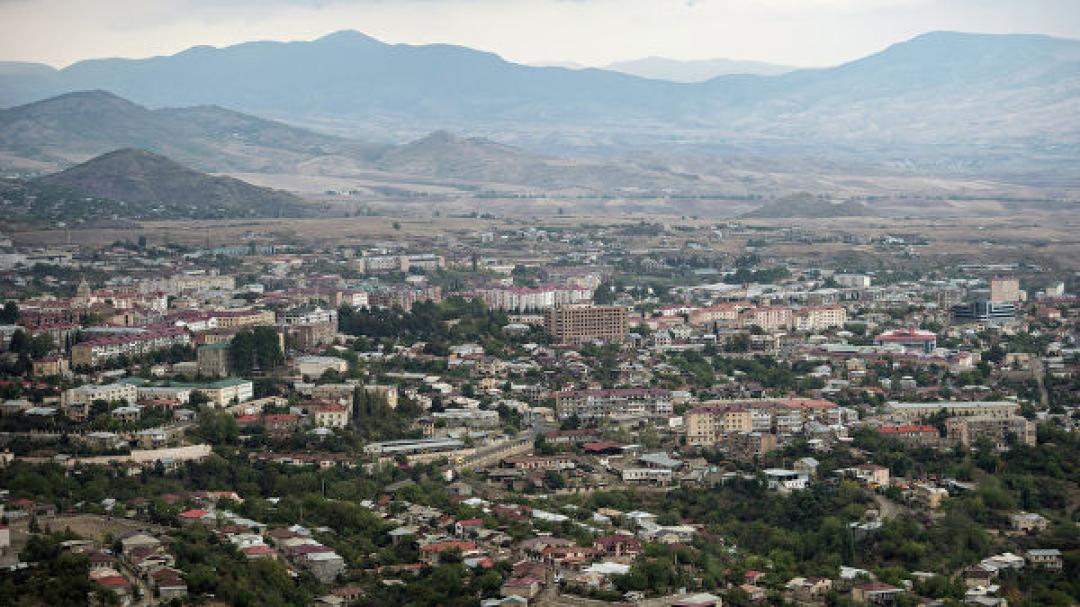
Second round of Nagorno-Karabakh presidential elections held despite declared state of emergency

On 15 April, the de-facto head of the Central Election Committee of the internationally non-recognized Republic of Nagorno-Karabakh Srbuhi Arzumanyan reported the preliminary results of the second round of the presidential elections which were held on 14 April. According to the preliminary results, Arayik Harutyunyan won the election.
According to the preliminary results, Harutunyan von 88% of the votes, while his rival Masis Myalyan 12%. In total, 47,165 voters or 45% of the total number of citizens voted in the second round of the presidential elections.
Speaking on his victory, Harutyunyan accused his opponents of politicizing the coronavirus problem in the region. According to him, the behavior of opponents and calls to postpone the elections were not dictated by concern for the people amid the pandemic, but by the realization of what the result of the vote would have been. However, he assured that he had no problems with individual politicians or figures and added that there would be no political persecutions.
His rival, Mayilyan urged the voters in Karabakh not to participate in the elections during the pandemic. He also refused to participate in the TV debates. Even before the first round of the elections a number of opposition figures have been holding protests demanding that the de facto authorities impose a state of emergency due to the coronavirus pandemic, including putting off the election (Caucasus Watch reported).
On 12 April, the still in office de-facto President of Nagorno-Karabakh Bako Sahakyan declared a coronavirus-related “emergency situation” in the region after 6 cases of Covid-19 infected persons were reported. The emergency rule banned public gatherings, restricted transport links within Karabakh and barred citizens of Armenia and other countries from entering the region. However, Sahkyan made it clear that the second round of presidential elections would go ahead as planned.
The Azerbaijani and Georgian Ministries of Foreign Affairs were the first to respond to the second round of presidential elections in the internationally unrecognized territory. “While expressing his attitude to this issue at the meeting in the form of videoconference dedicated to social and economic outcomes of the first quarter of 2020 held on April 14, the President of Azerbaijan Ilham Aliyev noted that these elections showed once again that nobody recognizes this illegal junta regime. We stress once again that irrespective of which phase of election is implemented, these election organized by the occupant country are nothing but a trickery play not having any legal force,” said the spokesperson of the Azerbaijani MFA Leyla Abdullayeva.
“The Georgian side does not recognize the so-called independence of Nagorno-Karabakh and therefore does not recognize the second round of the so-called presidential elections held in the region of Azerbaijan. Georgia supports the territorial integrity and sovereignty of the Republic of Azerbaijan within internationally recognized borders and supports the peaceful settlement of the conflict based on the principles and norms of international law,” read the statement of the Georgian MFA.
On 31 March, the elections for the new de facto president and the parliament of Karabakh were organized despite a number of calls to postpone the elections. Harutyunyan’s Free Fatherland party won more than 40 percent of votes for the de-facto parliament and would control 16 of the 33 seats, while the biggest opposition force was the United Homeland party of Samvel Babayan which got 9 seats.
The elections were condemned by many countries, including Georgia, Ukraine, Moldova, Turkey and Iran. The Director for Eastern Europe, Caucasus and Central Asia of the German Foreign Office Michael Siebert tweeted that both the elections and their results were considered illegal from the German standpoint of view. The OSCE Minsk Group Co-Chairs (Igor Popov, Stéphane Visconti and Andrew Schofer) who overlook the mediation process of the Nagorno-Karabakh conflict did not accept the results of these elections as affecting the legal status of Nagorno-Karabakh and stressed that the results in no way prejudge of the final status of Nagorno-Karabakh or the outcome of the ongoing negotiations to bring a lasting and peaceful settlement to the Nagorno-Karabakh conflict. Similar statements were made by the EU and NATO (Caucasus Watch reported).
See Also


Armenia Records 5.9% GDP Growth in 2024, Missing 7% Goal

Yerevan Balances Strategic Ties with Both US and Russia, Says Foreign Minister

FM Mirzoyan: Peace Deal with Azerbaijan Is Within Reach

Pashinyan and Erdogan Hold Call, Reaffirm Commitment to Ongoing Dialogue

